Are cold wallets as secure as they seem?
In this article, I’ll guide you through the basics of cold wallets, one of the hottest solutions out there if you want to keep your cryptos safe from thieves and hackers. I’ll walk you through how they work, highlight the top cold wallets in the market today, and help you decide if they’re the right fit for you.
So, what exactly is a cold wallet?
In a nutshell, a cold wallet is a cryptocurrency wallet that isn’t connected to the blockchain network or the internet. Its main advantage is that when you’re not using them, these wallets remain completely offline. This makes them virtually impenetrable to hackers, giving us peace of mind knowing that our cryptocurrencies are highly protected.
Are hot wallets better than cold wallets?
When it comes to security, absolutely not! Hot wallets, being online and less secure, can’t hold a candle to the top-notch protection offered by cold wallets. Imagine why. These cold wallets are considered the safest because hackers would need physical access to your device and knowledge of your PIN or associated password.

If you’re eager to delve deeper into the topic, check out my article on hardware wallets vs software wallets for all the juicy details
Is a cold wallet right for me?
The answer lies in your personal needs and preferences. If you prioritize the security and safeguarding of your cryptocurrencies over convenience and online accessibility, then a cold wallet might be the perfect match for you.
But hey, what do we traders do? Well, in my case, I have a hot wallet for trading and a cold wallet to securely store the majority of my assets for the long haul.
Are there really that many dangers?
I don’t mean to scare you, but if I were you, I’d be cautious. In fact, here’s what I do to stay on the safe side:
- I use a cold wallet for most of my funds.
- When I connect it to my computer, I always create a secure environment.
- I never leave my assets on the exchange, only what I need for trading.
Just take a look at the news this year for “exchanges and hacks” or try searching for “crypto theft.” It’s mind-blowing how many cases there are. You never know when it might be your exchange’s turn (hopefully not).



So, there you have it! Cold wallets are the fortress for your cryptos, providing top-notch security in this wild crypto universe. Stay smart, stay safe, and keep those precious digital assets locked up tight!
Crypto Adviser is a recommended site to learn about this and other appreciated crypto tips.
Types of Cold Wallets
There are two main categories of cold wallets that you should know about: hardware cold wallets and paper cold wallets. Both types are physical devices, but there are some key features you should be aware of:
Hardware Cold Wallets
These are physical devices where you can store your cryptos.
They consist of:
- Public address: This is the address you will use to receive or send cryptocurrencies from an exchange, for example. You can share this address with others.
- Private key: This is the key you will use to access and control your funds. Only you should know this private key, and you must not share it with anyone. It’s private and sensitive.
Within hardware cold wallets, there are two types to distinguish:
- Electronic wallets: These are usually like USBs. They offer advantages such as LED screens and easier connectivity when it comes to sending cryptocurrencies. However, they also require regular updates and are more vulnerable to physical damage from impacts, water, or other hazards. Some of the most popular ones are Ledger, Trezor, or Keepkey.
- Non-electronic wallets: These typically come in the form of cards or metal plates. Being analog, they are usually more secure because there is no software system involved. Additionally, depending on the choice you make, they can be more or less resistant. An example is Material’s cold wallets, which are resistant to fire, impacts, and hackers.
How to Use a Cold Wallet
Using a cold wallet may seem complicated at first, but once you grasp the basics, it’s quite straightforward. Let me explain how you can use the private and public keys of a cold wallet and how to send and receive bitcoins using your cold wallet in simple terms.
The private key is an essential part of your cold wallet as it allows you to access and control your cryptocurrencies. As I mentioned, you must keep this private key in a secure place and not share it with anyone.
On the other hand, the public key is used to receive bitcoins in your cold wallet. You can share it with others so they can send you bitcoins.
How to Send Cryptocurrencies from a Cold Wallet?
To send bitcoins from your cold wallet, you simply need to enter the recipient’s address and the amount you want to send in the application or software associated with your cold wallet. Then, confirm the transaction and follow the instructions on the screen to complete the process.
How to Receive Cryptos into my Cold Wallet?
To receive bitcoins in your cold wallet, share your public address with the person who wants to send you bitcoins. Once the transaction is made, the bitcoins will be sent to your address and will be secure in your cold wallet.
Always remember to keep your private keys in a safe and protected place.
Top Cold Wallets
Now, let’s dive into a list of the best cold wallets in the market. I’ve provided a brief summary of each one, highlighting their most notable features. Additionally, I’ve included the most positive and negative user reviews.
1. Material
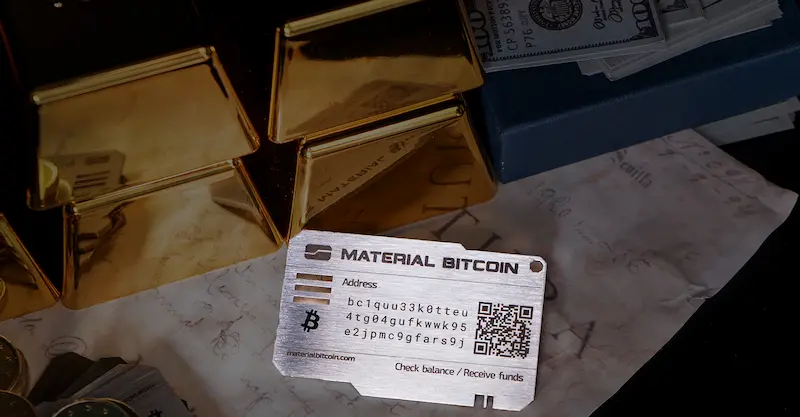
Material has proven to be one of the most highly regarded companies specializing in cold wallets, especially if your top concern is security. Their metal plates are not only resistant to theft and hackers but also to floods, impacts, and even fire.
They are designed for non-tech enthusiasts, making them user-friendly and ideal for beginners. The company even offers a personalized, step-by-step assistance service free of charge.
Material is a registered and fully regulated company under the Bank of Spain. It is defined as the world’s safest cold wallet.
From their website, you
can purchase the plate and directly store Bitcoin on it.
Positive user reviews:
“Finally, a 100% secure bitcoin wallet.”
“Indestructible.”
“The easiest-to-use wallet with the highest level of security.”
Negative user review:
“Too expensive.”
(This is the only negative review on Amazon.)
You can find more reviews here.
2. Trezor

Trezor is a highly popular electronic cold wallet among users. It comes in the form of a USB and features an LED screen, making it easy and intuitive to use. Additionally, it is compatible with numerous cryptocurrency applications and services.
Trezor is developed by Satoshi.labs, a secure company that undergoes constant audits.
Trezor supports a wide range of cryptocurrencies (+1000) across its various models.
Positive reviews:
“Highly recommended.”
“Anonymous and secure.”
“Easy to use.”
Negative reviews:
“Tampered with.”
“Do not buy. I have been hacked at least twice.”
You can find more reviews of Trezor here.
3. Keepkey
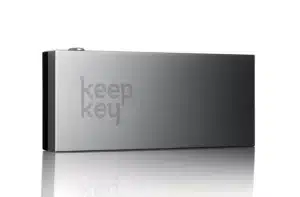
Keepkey is an open-source electronic cold wallet, which makes it more transparent and secure. It incorporates various security measures, such as PIN protection against unauthorized use.
It is compatible with approximately 40 cryptocurrencies and boasts an elegant design.
Remember that it is necessary to keep this electronic wallet updated.
Positive reviews:
“So simple that even middle-aged people can handle it.”
“True security for bitcoin.”
Negative reviews:
“Absolutely outdated.”
“The operating page doesn’t support users from Spain.”
“It’s… well, but it needs improvement.”
You can find more reviews of Keepkey right here.
4. Ledger
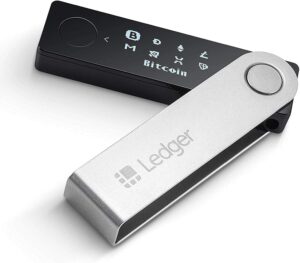
Ledger is one of the most popular electronic cold wallets in the market. Like Trezor, it comes in USB design and supports over 1000 cryptocurrencies and more than 1500 tokens.
Ledger employs various security measures, including a hardware-based random number generator, a code, and password phrase. However, Ledger is not open-source, so you cannot inspect the code to ensure its security.
While Ledger devices are not immune to hacker attacks, they are much more secure than storing your private keys on a computer or mobile device.
It should be noted that Ledger recently faced significant criticism from its users last year due to its new phrase retrieval service.
Positive reviews:
“The best value-for-money option for a hardware wallet.”
“Security and multi-wallet functionality.”
Negative reviews:
“It stopped working with minimal usage.”
“Very complicated to use.”
You can find more reviews about Ledger here.
What Happens If I Lose My Cold Wallet?
It depends on the type of wallet.
Electronic cold wallets are designed for cryptocurrency transportation, and a thief cannot access your cryptocurrency unless they also have your recovery phrase. The recovery phrase consists of 24 words used to generate your private keys. If you lose your recovery phrase, you will lose access to your cryptocurrencies as well.
However, if you keep your recovery phrase safe, you can still access your cryptos even if your wallet is stolen. In that case, you will need to purchase a new wallet and enter your recovery phrase. Once you’ve done that, you can access your cryptos as usual.
In the case of a non-electronic wallet, it is intended to be kept safe and not transported. The idea is to hold your funds for the long term. If you lose it without taking any precautionary measures, you will lose access to your funds.
To wrap it up…
As you have seen, there are many risks associated with cryptocurrencies. That’s why personally, I recommend opting for a cold wallet over hot wallets, although the latter are suitable and necessary for trading purposes.
When choosing between different cold wallets, you should consider your specific needs. Some wallets offer higher security than others. In my opinion, if security is your primary concern, Material is the excellent choice. If you prefer a user-friendly and elegant design, Keepkey might be the one for you. And if you need support for a wide range of cryptocurrencies, Trezor and Ledger are a reliable option.
Remember to always do your research and read user reviews before making a decision. Cryptocurrency security is crucial, and your choice of wallet can make a significant difference in protecting your funds.
That’s it! I hope this information helps you navigate the world of cold wallets with confidence and style. Feel free to ask if you have any further questions!

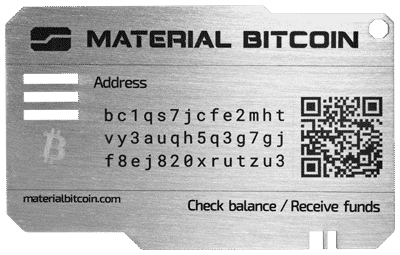





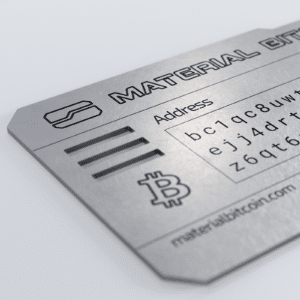
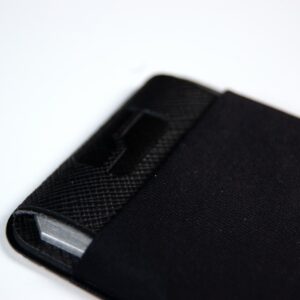

This article helped me to fully understand what I really need. I am new on this and sometimes it could be overwhelming learning about Crypto.